President Dwight D. Eisenhower Defends Character and Record of Gen. George C. Marshall
In 1951, Sen. Joseph McCarthy, as part of his crusade against Communism, began accusing Gen. George Marshall of being a liar – “a man steeped in falsehood;” and soft on Communism, “fostering governmental policies that enhanced Soviet objectives,” according to a New York Times article from Aug. 1954. He continued bashing on the general’s record over several years, including entering into the Congressional record a scathing letter on Marshall’s character from former Secretary of War Henry Woodring on Aug. 2, 1954, in which Woodring wrote, “he [Marshall] would sell out his grandmother to personal advantage,” “he would sell out his politics, beliefs and standards to maintain his political and military position with the powers that be.”
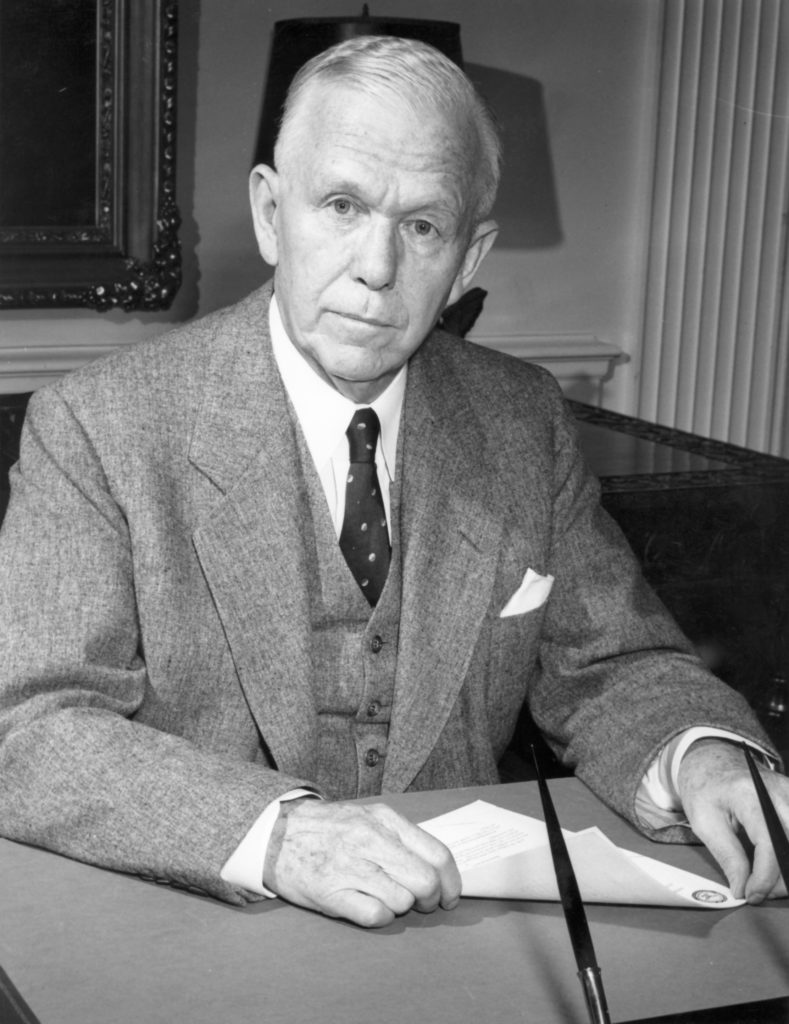
Secretary of Defense George C. Marshall in 1951.
Obviously, these attacks did not sit well with many of the men and women Marshall worked with, among them Presidential candidate Dwight D. Eisenhower. Eisenhower defended Marshall throughout his 1952 campaign stops, praising Marshall as “a man and a soldier” and a “great patriot.” When Eisenhower was to give a speech in Wisconsin, McCarthy’s home state, he was persuaded by the governor to leave out any mention of Marshall.
This brought the ire of one of Marshall’s staunchest allies, President Harry Truman, who said of candidate Eisenhower, “I had never thought the man who is now the Republican candidate would stoop so low.” This obvious omission also angered Katherine Marshall, who reportedly never forgave Eisenhower.
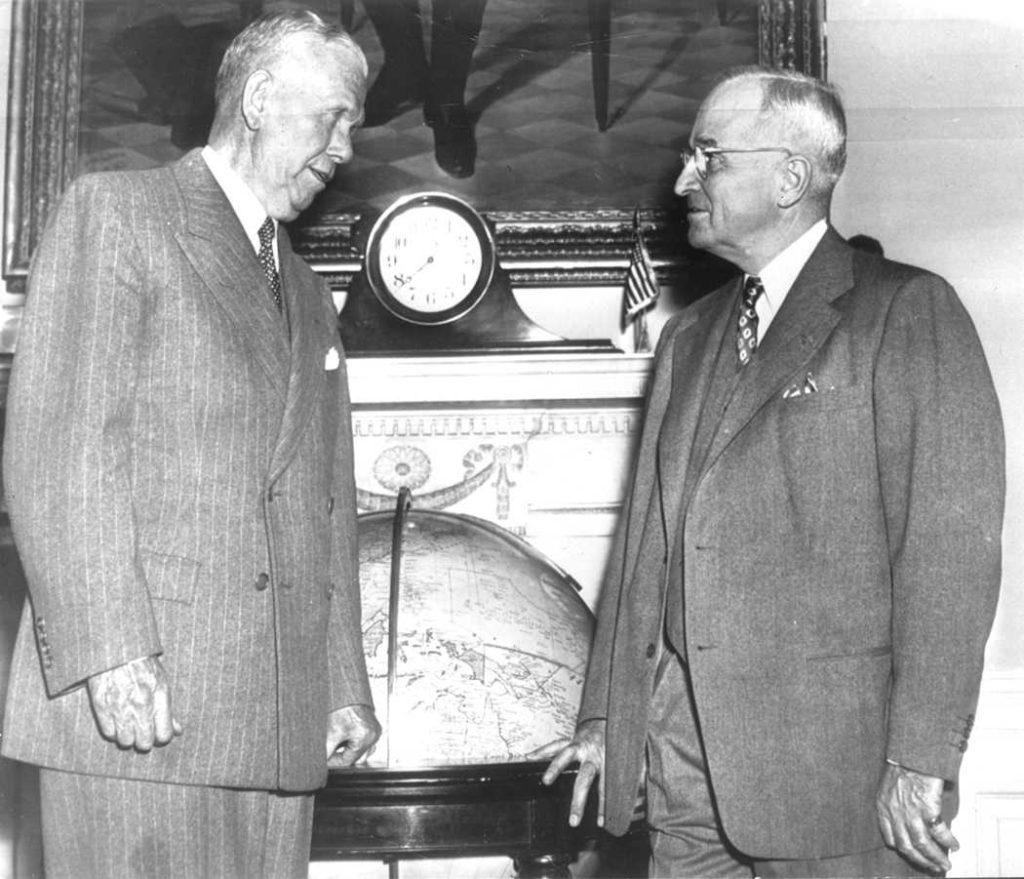
Secretary of Defense George C. Marshall and President Harry Truman, September 1950.
President Eisenhower generally refused to speak directly about McCarthy, denying him more press, and commenting, “I will not get in the gutter with this guy.” Eisenhower had been complimentary of Marshall in his post-war book Crusade in Europe, noting that “the vision and determination of one man” had prepared the War Department for World War II; that Marshall had “for many months deliberately followed the hard way, determined that at whatever cost to himself or to anyone else the Army should be decently prepared.”
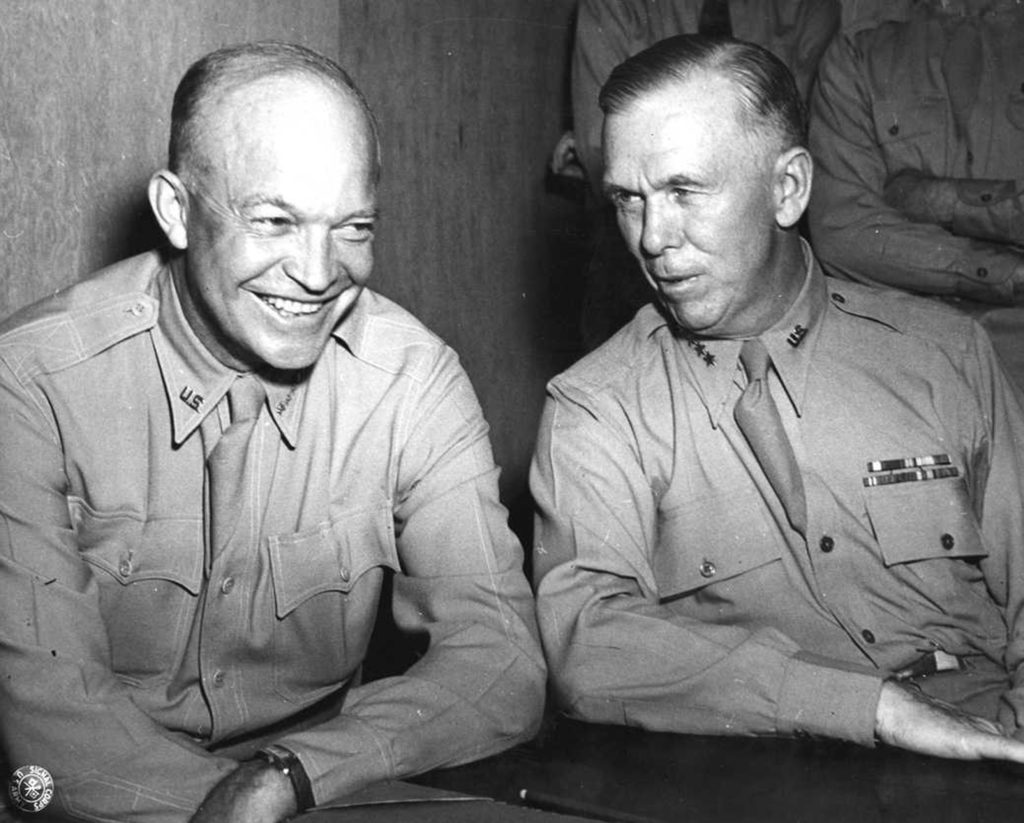
Gen. Dwight D. Eisenhower and Gen. George C. Marshall in Algiers, June 1943.
After the Woodring letter, President Eisenhower was questioned about his view of it in a press conference. This time, the President did not shy away from making a proclamation about George Marshall’s character, spending a few minutes candidly stating what he thought of Marshall.
Ladies and gentlemen, there are some things that cause me to be almost emotional.
Now, I believe that there are many of you here who knew General Marshall well, yourself, all during his war years, the work he did and the way he did it.
I happened to be one of those Army officers that did not meet General Marshall except in the most casual way until the war started. I think I had seen him twice in my life, in neither case not over a minute or two at the time. I was brought in, and my relationships with him have been largely, almost exclusively, official. But I would like to say, and I have been saying this ever since I first knew him well, that he to me has typified all that we look for in what we call an American patriot.
I saw many things he did that were proof to me, at least, of his selflessness. I am quite certain that he did not want to sit in Washington and be a Chief of Staff. I am sure he wanted a field command, but he wouldn’t even allow his Chief to know what he wanted, because he said, “I am here to serve and not to satisfy personal ambition.”
Now, later, of course, he went–after all, the war was over–to a different post. What the circumstances were of that post, I know nothing. What were his judgments, what were the things that could have been done and were not done or what things were done that should not have been done, I don’t know. But I do know that General Marshall served according to his conceptions of his duty to his Chief.
I tried to put this in a book that I wrote once, and maybe somebody heard about it. I tried to say what I thought about him. I have been saying it ever since, and I shall continue to say it until there is evidence that I just don’t believe exists in this world that I am wrong.
So I repeat that I think that to reward a man who gave at least 50 years of his life to the service of his country–a great deal of it in junior positions, but if you go back through his record you will find it was a brilliant record, always serving to the best of his ability. I believe as a first lieutenant, if I recall, he was picked out to serve as the Chief of Staff of the greatest maneuvers ever held in the Philippines until that time; it was indicative of his ability and his dedication to his job. And all the way through, his record is studded with that kind of performance.
I think it is a sorry reward at the end of that long term to say that he is not a loyal, fine American, and that he served only in order to advance his own personal ambitions.
I can’t imagine anyone that I have known in my career of whom this is less so than it is in his case.
I am sorry if I have made a speech, but that is the way I feel.
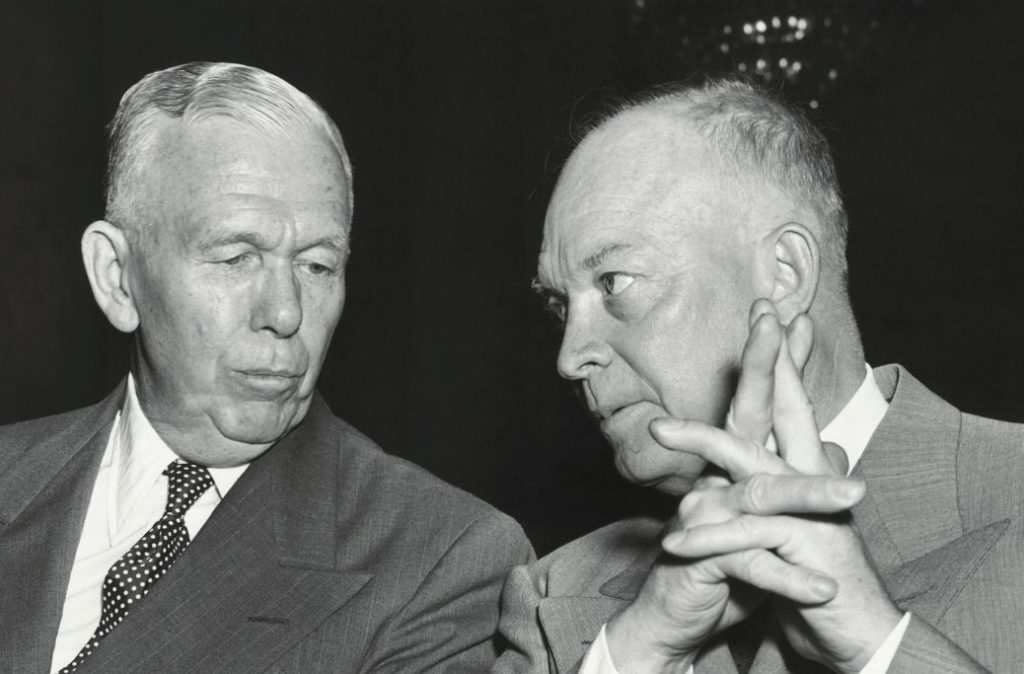
George C. Marshall and President Dwight D. Eisenhower
Could candidate Eisenhower have been more focused on addressing the slander on Marshall by McCarthy? Perhaps. But I think that President Eisenhower’s honest, heartfelt comments in the summer of 1954 make it perfectly clear what he thought of Gen. George C. Marshall.
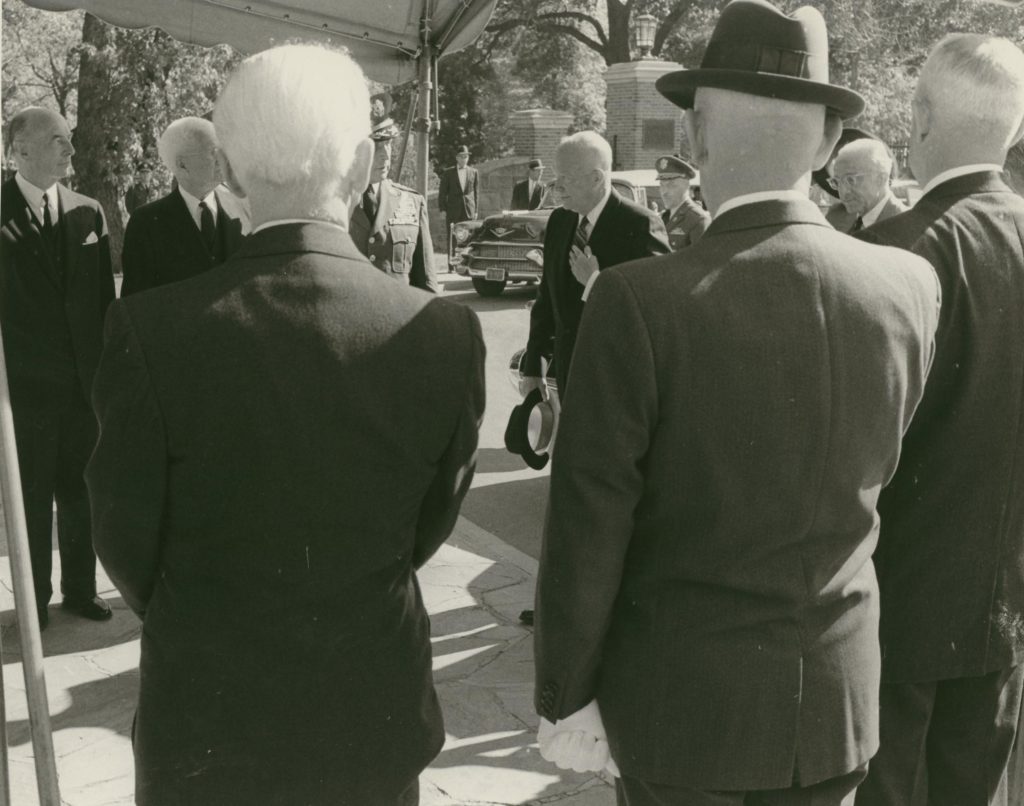
President Dwight D. Eisenhower arriving at the funeral of Gen. George C. Marshall, Oct. 20, 1959.
Of course, the President attended the funeral of his former boss Gen. George Marshall at the Fort Myer chapel on Oct. 20, 1959. His attendance was not the last tribute Eisenhower paid to Marshall – he and Katherine overcame differences the next fall to unveil a bust of Eisenhower at the dedication of the Marshall Space Flight Center.
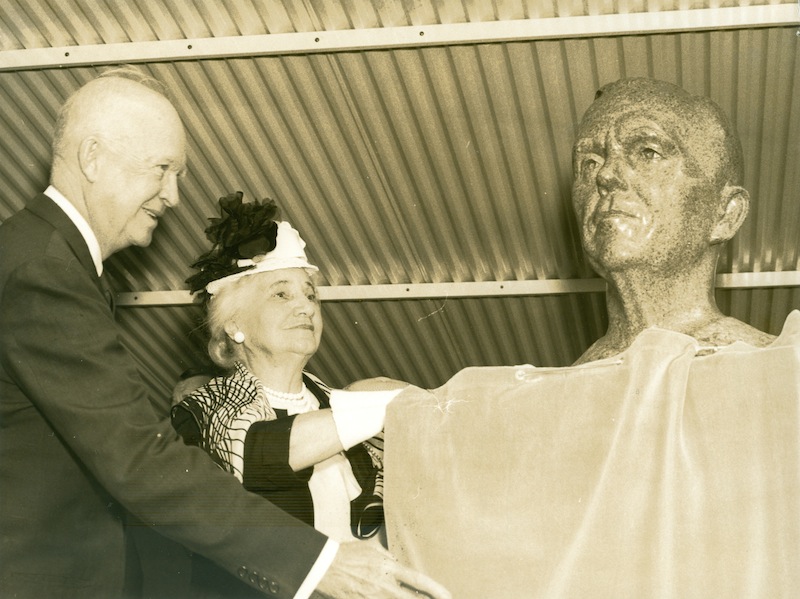
President Dwight D. Eisenhower and Katherine Marshall unveil the bust of Gen. George C. Marshall at the dedication of the Marshall Space Flight Center, Sep. 8, 1960.
Former President Eisenhower also attended the dedication of the George C. Marshall Foundation building in Lexington, VA, in May 1964.
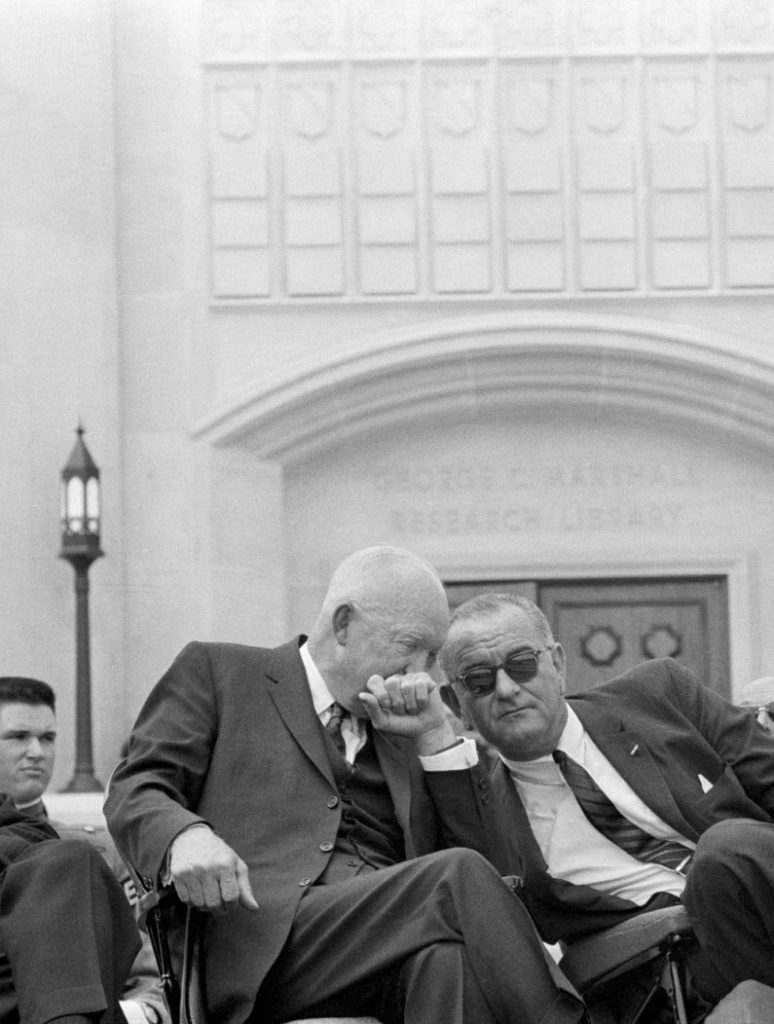
Former President Dwight D. Eisenhower talks with President Lyndon B. Johnson at the dedication of the George C. Marshall Foundation building in Lexington, VA, May 23, 1964.
Melissa has been at GCMF since fall 2019, and previously was an academic librarian specializing in history. She and her husband, John, have three grown children, and live in Rockbridge County with two large rescue dogs. Keep up with her @MelissasLibrary.
